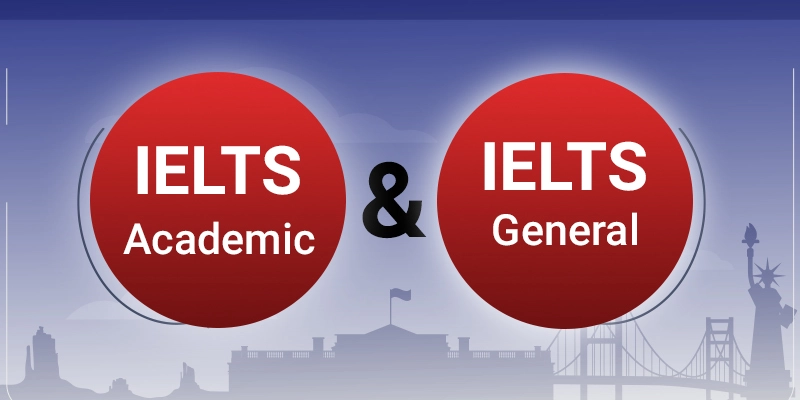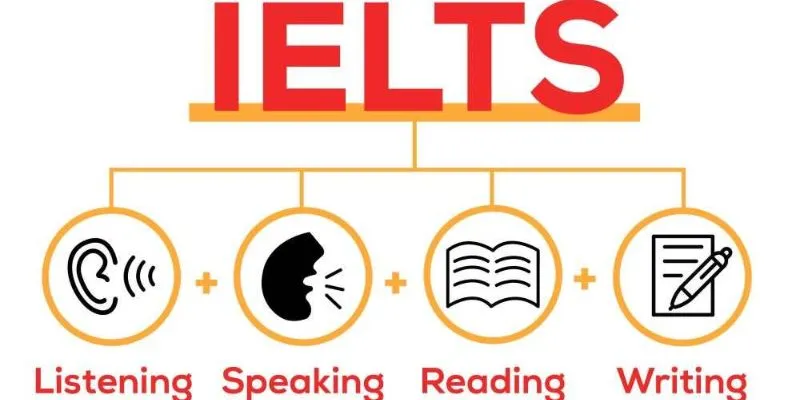If you aim to pursue higher education abroad or look for career and business opportunities outside the country, it is important to qualify for the IELTS test. This test is international, and clearing the IELTS certifies that you can understand and adapt to the work atmospheres in International Universities in countries where English is the predominant language. Let us discover in detail what IELTS tests are about and their divisions, and find out how they help you transform your life.
IELTS Test Types
Currently, there are two types of IELTS tests, namely the General Training and Academic Tests. In both these types, the Speaking and Listening divisions are similar. Where they differ is in the Reading and Writing divisions. Both these test types are used to assess the language ability of the learners. This IELTS test helps you find educational prospects in countries where English is the primary language. Numerous social situations require you to use your everyday English language skills, including workplaces, training centers, teaching in schools and colleges, and immigration procedures.
IELTS General Training
The reading test has three sections with increasing difficulty. Section 1 may have two or three short texts or several shorter texts. Section 2 has two texts, and Section 3 has one long text. The topics in Section 1 are everyday topics related to living in an English-speaking country. Section 2 focuses on work-related topics, and Section 3 covers a general interest topic. It is important to transfer your answers to the answer sheet within the 60 minutes allocated for the Reading test and be cautious with spelling and grammar to avoid deduction of marks. The test has 40 questions, and each correct answer receives one mark, with the final score given as a band score from 1–9.
In the Writing section of the IELTS exam, there are two tasks. The first task requires writing a letter of at least 150 words in 20 minutes, while the second task involves writing an essay of at least 250 words in 40 minutes. It’s important to note that answers must be written using full sentences on the answer sheet, and any notes written on the question paper will not be seen by the examiner. Certified IELTS examiners assess performance on each Writing task based on four main criteria: task achievement/response, coherence, lexical resource, and grammatical range and accuracy.
Task achievement and task response consider how well the requirements are fulfilled, with a minimum word count for each task. Coherence and cohesion assess the clarity, fluency, and organization of ideas, as well as the use of cohesive devices. Lexical resource evaluates vocabulary range and usage, while grammatical range and accuracy assess the variety and correctness of grammar. In summary, the time allowed for the Writing section is 60 minutes, consisting of two tasks, with the second task contributing twice as much as the first task to the Writing score.
IELTS Listening Test
In the listening test, there are four parts. Parts 1 and 2 deal with daily conversations and social situations. Part 1 contains a conversation between two speakers, while Part 2 involves a single person speaking, for example, giving a speech about local facilities. On the other hand, Parts 3 and 4 focus on educational and training situations. Part 3 features a conversation between two main speakers, such as university students discussing a topic guided by a tutor. In Part 4, only one person speaks on an academic subject. There will be various accents, including British, Australian, New Zealand, and North American, which will be used in the recordings.
You will listen to the recordings only once and will have approximately 30 minutes to complete the test, with an additional 10 minutes to transfer your answers to an answer sheet. It is essential to be careful with spelling and grammar when writing your answers to avoid losing marks. Totally 40 questions will have to be answered. The candidates are awarded one mark for a correct answer. The final score is presented as your brand score in whole or half bands, for example, 6.5 or 7 etc.
IELTS Academic Reading
The reading test consists of three different sections of increasing difficulty. Section 1 may include a couple of short texts or several shorter texts, whereas Section 2 contains two texts. Then comes the third section, the Section 3, which features a long text. The texts in Section 1 cover everyday topics like notices, advertisements, and timetables that are relevant to living in an English-speaking country. In Section 2, the texts focus on work-related topics such as job descriptions, contracts, and staff development. Section 3 includes a longer and more complex text on a topic of general interest, typically taken from newspapers, magazines, books, and online resources.
You are required to present your answers to an answer sheet within the allotted 60-minute time frame for the Reading test. Remember that no extra transfer time is provided, and pay attention to spelling and grammar when writing your answers. This section also, like the listening test, contains 40 questions, each carrying 1 mark. The final scores are given in either half or full bands.
IELTS Speaking Test
In the speaking test, the test taker engages in a face-to-face interview with an examiner, and the entire session is recorded. The test consists of three parts, each designed to assess speaking ability in different ways. Throughout the test, certificated IELTS examiners evaluate the test taker’s performance based on four criteria, including fluency and coherence testing, lexical resource, grammatical range and accuracy, and pronunciation. Fluency and coherence focus on the ability to speak at a normal speed without hesitation, organise ideas logically, and use cohesive devices effectively.
Lexical resources assess the range and accuracy of vocabulary usage, including the ability to express ideas using alternative vocabulary. Grammatical range and accuracy: evaluate the range and accuracy of grammar usage. Lastly, pronunciation assesses the ability to speak clearly and be understood easily. IELTS Coaching in Chennai helps you take the IELTS test and emerge victorious.
The test typically lasts for 11–14 minutes and comprises three parts. In the first part, the interviewer or tester introduces himself and interacts with you to learn about you and check your abilities to handle general conversations and how you give your opinions and express your thoughts on familiar topics.
The second part begins with the examiner handing over a task card to you. You are given a topic and points relevant to that topic, and you are given a minute of time to prepare your speech. You are then expected to talk for at least 2 minutes on the given topic. The examiner might take notes while you talk and may ask you questions based on your speech at the end. For this section, you will be asked to discuss a specific topic at length using suitable language and organize your thoughts coherently. Your own experiences will be crucial in crafting your extended response.
In the third part, you will have to involve yourself in a discussion with the examiner on the topic given for your 2-minute speech. You should express your views in a detailed, general, and abstract manner. This part assesses your ability to discuss, express opinions, and speculate on the issues.
Test Match Rules
You can retake a single module of the IELTS test after 60 days of your first attempt. The fee for retaking a single module in India is 16,250 INR. Electronicitems like mobiles and laptops are not allowed in the test room. IELTS now offers computer-delivered tests for Listening, Reading, and Writing, and there are more test dates availablethroughout the year, providing greater flexibility.
In conclusion, Spoken English Classes in Chennai offer a great opportunity to enhance English speaking skills, particularly for those living in and around Chennai. With adequate preparation and training, achieving high band scores in the IELTS tests is feasible, and these scores hold international value and recognition. Proficiency in English will also alleviate the challenge of presenting research papers, and IELTS proficiency is a requirement for professors and scholars.






